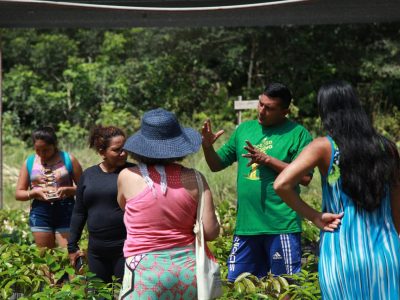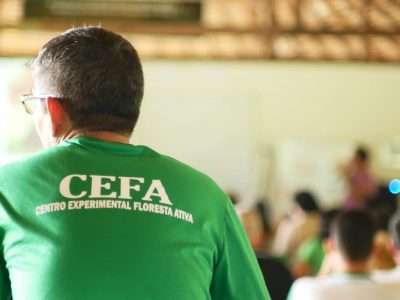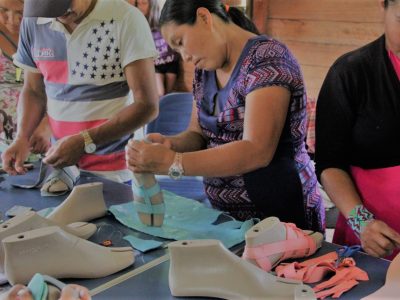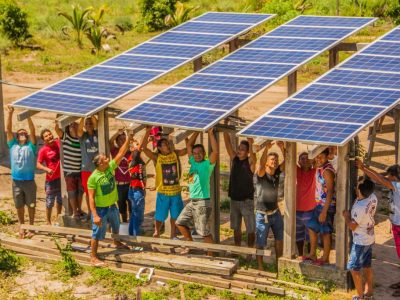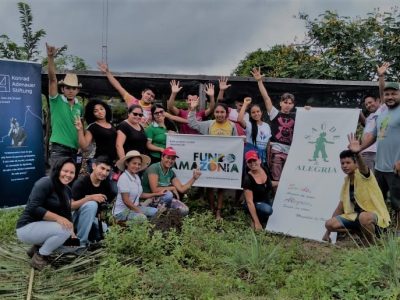Forest Economy
Sociobiodiversity Chains
PSA activities include the entire chain from end to end, in working towards inclusion of the communities in the sociobiodiversity product market, with the appropriate sharing of benefits and the preservation of the forest.
Based on studies and technical surveys, PSA identifies and measures the productive potential of the communities, correlating it to real market demands. The sociobiodiversity productive chains with greater potential in Western Pará are meliponiculture, the production of oils and essences, and organic agriculture.
PSA promotes innovative and sustainable practices of production of raw material, which, along with traditional knowledge, add value to the products generated from families’ extractive and farming activities. With this, participants are better able to respond to companies with the potential to buy such products. Supported by the Active Forest Experimental Center (CEFA), the actions include training and development of innovative solutions, marketing support, administrative and financial advisory, structuring of business plans and orientation on associativism, among others.
Focused on the National Plan for Strengthening Extractive and Riverside Communities (Planafe), PSA and its partners also seek to expand the list of biodiversity products considered by the Minimum Price Guarantee Policy for Sociobiodiversity Products (PGPM-Bio) – a Federal Government regulation which currently guarantees a minimum price for 17 extractive products that assists in conservation of Brazilian biomes.
Meliponiculture
Protecting the diversity of stingless bee species (threatened by deforestation, forest fires and by the intensive use of agricultural pesticides) is imperative to maintain the forest. These bees are largely responsible for the pollination of native trees. Raising stingless bees to produce honeys and derivatives (such as royal jelly, propolis and wax) has a positive impact both on the environment and on the income of the riverside communities.
PSA’s meliponiculture includes the training of producers, delivery of kits, support for the certification of products and development of logistic solutions for the adequate distribution of production. In addition, marketing efforts will receive a boost with the creation of the Honey House (“Casa do Mel”), in the Forest Economy EcoCenter, in the city of Santarém.
Oils and Essences
In forest communities, the extraction of essential vegetable oils is a traditional activity, but it requires inputs, tools and technologies in order to be socially and environmentally sustainable. PSA helps extractive communities identify which species to invest in, provides seedlings and seeds (therefore also contributing to repositioning of the native forest) and disseminates scientific findings to achieve better economic use and lower environmental impact. Trainings include courses, regular workshops, in addition to an annual seminar held at CEFA.
The project also establishes partnership with companies, connecting local producers with cosmetic, food and pharmaceutical industries.
Organic Agriculture
Through research and experiments carried out in the Socioproductive Units, PSA develops organic vegetable systems and garden “tcrops, disseminating sustainable farming practices and stopping traditional reliance on fires to clear fields. Families and students receive training in management of gardens without fertilizers and industrialized pesticides, and learn efficient management of family farming. The program also plans on providing support for: selection of crop combinations, local agroforestry, live pharmacies, horticulture, fish farming, farming of small animals, sharing of techniques for improved production of flour, multiple uses of latex, products appropriate for school lunches, among others.
The distribution and marketing of the products are also supported through technical advisory – as well as the regular organics fair to be installed at the Santarém EcoCenter.
See also
Agroecology and Repositioning of the Forest
Socioproductive Units
Community and Artisanal Tourism
Renewable Energies
Socioenvironmental Business Incubator
Contact
- Av. Mendonça Furtado, 3979
- +55 93 3067-8000
- +55 93 99143-1091
- psa@saudeealegria.org.br
HOW TO HELP
Projeto Saúde & Alegria © 2020
Agência Fervo

